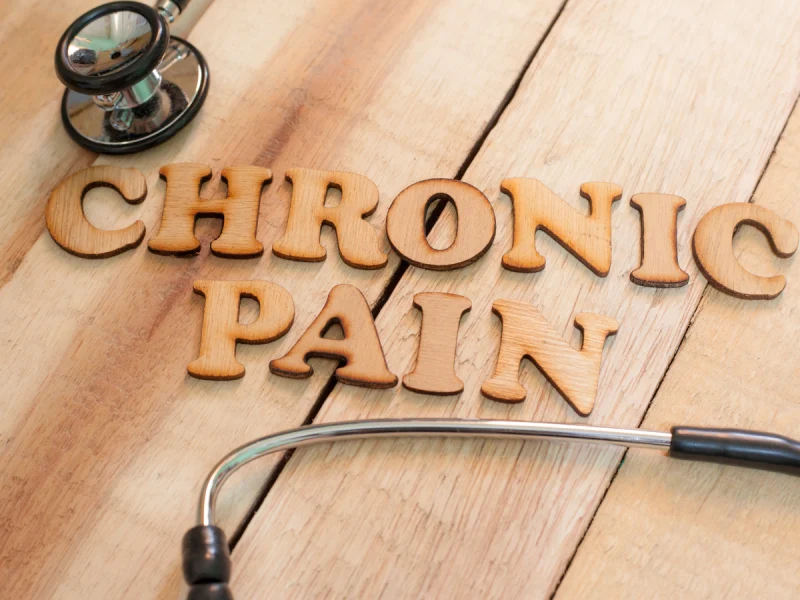How Is Chronic Pain Defined? What The Pros say
According to the National Institute of Neurological Disorders and Stroke, chronic pain is defined as pain that persists for more than 12 weeks. Chronic pain can be extremely debilitating, making it difficult to perform everyday tasks. There are a number of different treatment modalities you can consider to help manage chronic pain that we will address.
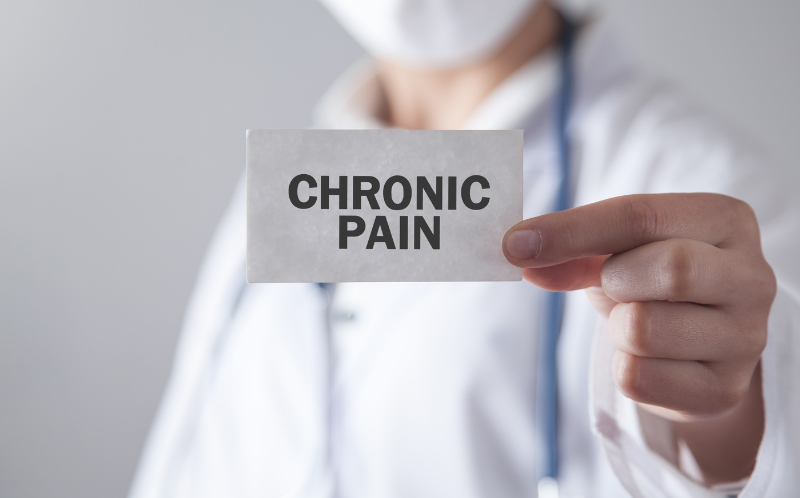
What Causes Chronic Pain?
Chronic pain can be caused by a single event, such as an injury, or it can be the result of a long-term medical condition, such as arthritis, cancer, stress, or nerve damage.
Infectious Diseases That Cause Chronic Pain:
- Lyme disease
- Shingles
- HIV/AIDS
- Hepatitis
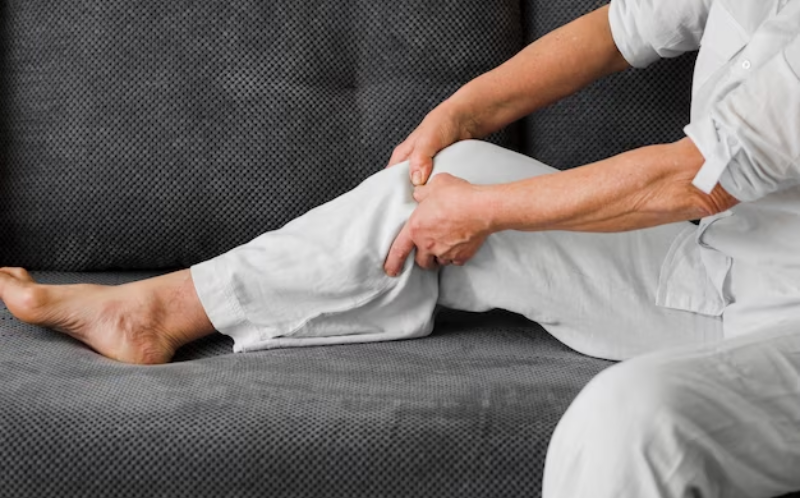
Top 10 Categorized Causes Of Chronic Pain
- Musculoskeletal Conditions: Osteoarthritis, Rheumatoid Arthritis, Bursitis, Tendinitis, Fibromyalgia, Spinal Stenosis, Herniated discs, Irritable Bowel Syndrome (IBS), and Myofascial Pain Syndrome can lead to chronic pain in the joints, muscles, or soft tissues.
- Back Pain: Chronic back pain can result from issues like herniated discs, spinal stenosis, degenerative disc disease, or structural abnormalities of the spine.
- Neuropathic Pain: Diabetic neuropathy, Post-Herpetic Neuralgia (shingles), Trigeminal Neuralgia, Central Post-Stroke Pain (CPSP) and nerve injuries can cause persistent nerve pain.
- Migraines and Headaches: Chronic migraines, cluster headaches, or tension-type headaches can lead to recurrent and long-lasting head pain.
- Cancer: Tumor pain, Cancer itself, or cancer treatments like surgery, radiation, and chemotherapy can cause chronic pain in cancer patients.
Conditions such as osteoarthritis, rheumatoid arthritis, fibromyalgia, and myofascial pain syndrome can lead to chronic pain in the joints, muscles, and soft tissues.
Chronic back pain can result from issues like herniated discs, spinal stenosis, degenerative disc disease, or structural abnormalities of the spine.
Conditions like diabetic neuropathy, post-herpetic neuralgia (shingles), and nerve injuries can cause persistent nerve pain.
Chronic migraines or tension-type headaches can lead to recurrent and long-lasting head pain.
Cancer itself or cancer treatments like surgery, radiation, and chemotherapy can cause chronic pain in cancer patients.
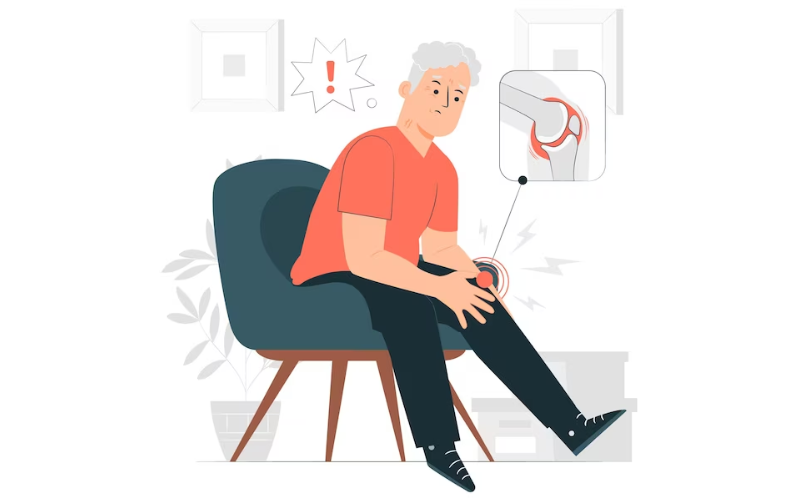
This is a chronic pain disorder characterized by widespread musculoskeletal pain, fatigue, and tenderness in specific points on the body.
Conditions like lupus, multiple sclerosis, and rheumatoid arthritis can lead to chronic pain due to inflammation and tissue damage.
Conditions like endometriosis, pelvic inflammatory disease (PID), or interstitial cystitis can cause ongoing pelvic pain.
Conditions like temporomandibular joint disorder (TMJ), tension-type headaches, or cervicalgia can result in persistent pain in the head and neck region.
Some individuals may experience chronic pain after surgery, known as post-surgical or postoperative pain, which can be caused by nerve damage, scar tissue formation, or other factors.
- Fibromyalgia: This is a chronic pain disorder characterized by widespread musculoskeletal pain, fatigue, and tenderness at specific points on the body.
- Autoimmune Diseases: Conditions like lupus, multiple sclerosis, Sjogren’s syndrome, Crohn’s disease, Ulcerative colitis and rheumatoid arthritis can lead to chronic pain due to inflammation and tissue damage.
- Chronic Pelvic Pain: Conditions like endometriosis, pelvic inflammatory disease (PID), or interstitial cystitis can cause ongoing pelvic pain.
- Chronic Head and Neck Pain: Conditions like temporomandibular joint disorder (TMJ), tension-type headaches, or cervicalgia can result in persistent pain in the head and neck region.
- Chronic Post-Surgical Pain: Some individuals may experience chronic pain after surgery, known as post-surgical or postoperative pain, which can be caused by nerve damage, scar tissue formation, or other factors.
This is not an exhaustive list, and many other conditions can cause chronic pain. It’s important to remember that chronic pain can also be caused by a combination of factors and may not have a clear underlying cause.
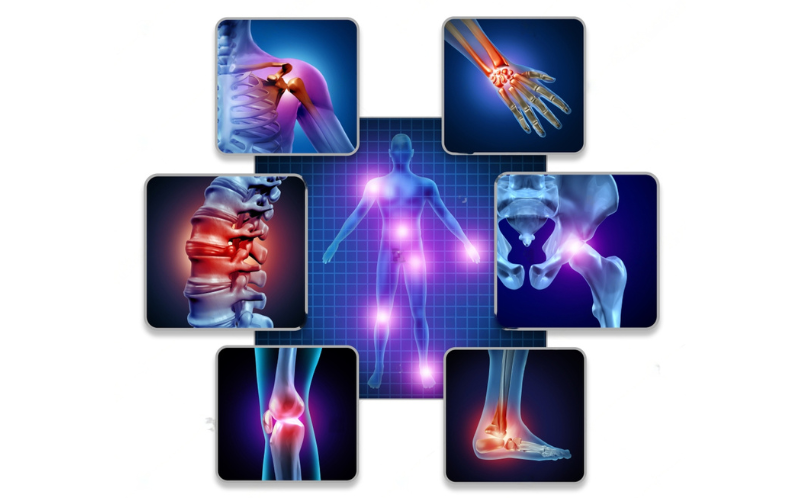
Chronic Pain Statistics:
- 1 in 5 adults in the U.S. experience chronic pain
- 8% of adults have high-impact chronic pain
- 84% of high-impact chronic pain patients can’t work outside of the home
- Chronic pain is the Number 1 cause of disability and disease globally
- 80% of adults in the U.S. will experience back pain at some point in their life
- Approximately 15 million adults say they have severe joint pain from arthritis
- 21% to 29% of patients misuse opioids prescribed for chronic pain
According to the Centers for Disease Control and Prevention (CDC), there are studies that have concluded cannabis helps people who have neuropathic pain. There is also compelling evidence that states that legalizing cannabis for medical usage has seen a reduction in the number of opioids prescribed.

Tips To Manage Chronic Pain at Home: Without Hardcore Drugs
- Use heat and/or cold treatments
- Stay active
- Eat a clean diet, eliminating foods that cause more inflammation
- Stretch or do Yoga
- Use a sauna
- Swim if you have a pool
- Exercise, lift weights, walk or run
- Raise your legs for 20–30 minutes so they are as high or higher than your hips.
- Take regular breaks from physical tasks
- Try to stand, sit, or walk with good posture
- Have a well-balanced and healthy diet
- Go for a massage or learn to massage yourself
- Try to drink lots of water. Between half an ounce to an ounce per pound of your total weight (if you weigh 140 pounds, that would be 70 to 140 ounces of water per day).
- Use comfortable shoes that relieve pressure on your joints.
- Sleep between 7-9 hours a day
- Manage stress levels
- Avoid foods that cause inflammation.
- Consult with a doctor to see if medical cannabis may help you
- Use heat and/or cold treatments
- Stay active
- Eat a clean diet, eliminating foods that cause more inflammation
- Stretch or do Yoga
- Use a sauna
- Swim if you have a pool
- Exercise, lift weights, walk or run
- Raise your legs for 20–30 minutes so they are as high or higher than your hips.
- Take regular breaks from physical tasks
- Try to stand, sit, or walk with good posture
- Have a well-balanced and healthy diet
- Go for a massage or learn to massage yourself
- Try to drink lots of water. Between half an ounce to an ounce per pound of your total weight (if you weigh 140 pounds, that would be 70 to 140 ounces of water per day).
- Use comfortable shoes that relieve pressure on your joints.
- Sleep between 7-9 hours a day
- Manage stress levels
- Avoid foods that cause inflammation.
- Consult with a doctor to see if medical cannabis may help you
At home, it is important to create a comfortable environment. Invest in a good mattress and pillow, and make sure your sleeping surface is free of any bumps or lumps. You should also avoid any activities that aggravate your pain. Let your family know so they can help you navigate things better.
Tips To Manage Chronic Pain at Work:
- Make sure your workstation is as ergonomic as possible and take regular breaks
- Relaxation and breathing techniques may help relax your body and mind.
- Try to stand, sit, or walk with good posture and pay attention to your current posture
- Stand every hour for at least one minute
- Make your computer monitors eye level and try not to keep from bending your neck forward for a prolonged period of time
- Consume adequate amounts of water. Between half an ounce to an ounce per pound of your total weight
- Let your colleagues and boss know so that they can help you navigate the work day better
- Make sure your workstation is as ergonomic as possible and take regular breaks
- Relaxation and breathing techniques may help relax your body and mind.
- Try to stand, sit, or walk with good posture and pay attention to your current posture
- Stand every hour for at least one minute
- Make your computer monitors eye level and try not to keep from bending your neck forward for a prolonged period of time
- Consume adequate amounts of water. Between half an ounce to an ounce per pound of your total weight
- Let your colleagues and boss know so that they can help you navigate the work day better
At work, it is important to discuss your chronic pain with your boss or supervisor. They may be able to accommodate your needs by modifying your job duties, workstation, or schedule. Talk with your doctor about some of these options.
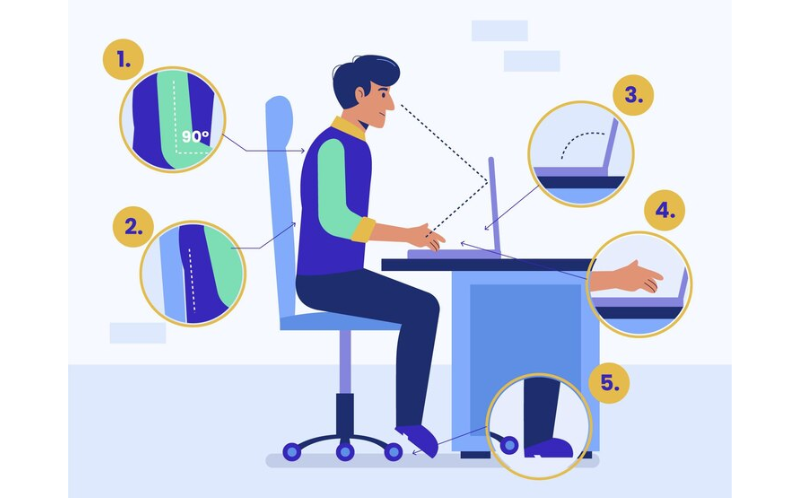
Inquiring Minds Want to Know: Is Cannabis Effective at Treating Chronic pain?
A study published in 2019 in the Journal of Psychoactive Drugs reviewed the data of one thousand people using cannabis to determine its efficacy in treating chronic pain. They determined that 65% of the subjects were taking cannabis for pain. Eight out of ten found it to be efficacious for them. 82% of them reduced or stopped ingesting OTC pain medications, and a whopping 88% stopped taking opioids altogether.
While chronic pain can be difficult to deal with, there are some things you could do to help manage and reduce the pain during the course of your day. It is important to discuss your options with your doctor first and ask what they recommend would help best with your unique situation.
It is important to consult with a doctor to develop a treatment or pain management plan. This may include medication, physical therapy, and lifestyle changes.
If you are living with chronic pain, here are some tips to consider to help manage symptoms:
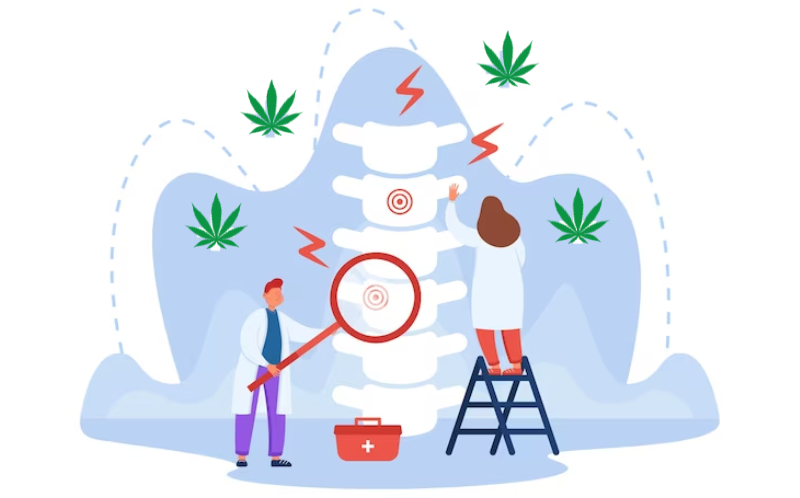
Medical Marijuana for Chronic Pain Management: 10 Key Benefits that Help Relieve Symptoms
Anti-Inflammatory: Certain compounds in marijuana, particularly CBD (cannabidiol), are known for their anti-inflammatory benefits. By reducing inflammation, medical marijuana can help reduce pain associated with conditions like arthritis and neuralgia.
Analgesic Properties: THC (tetrahydrocannabinol), the primary psychoactive compound in cannabis, has been shown to act as an analgesic. It alters the perception of pain in the brain, helping to reduce pain intensity and discomfort.
Muscle Relaxant: Medical marijuana has muscle relaxant properties, providing relief for patients with conditions like multiple sclerosis and fibromyalgia, where muscle stiffness and spasms contribute to pain.
Neuropathic Pain Relief: Cannabis is known to alleviate neuropathic pain caused by various conditions, including diabetes and shingles, by targeting the faulty pain signals traveling from damaged nerves.
Improves Sleep: By helping to alleviate discomfort and induce relaxation, medical marijuana can improve sleep quality. Better sleep can significantly impact one’s perception of pain and overall quality of life.
Reduces Anxiety And Depression: Chronic pain often comes with emotional distress. Cannabis, especially strains high in CBD, can have anxiolytic and antidepressant effects, contributing to a reduced focus on pain.
Synergistic Effects With Opioids: Some studies suggest that cannabis can synergize with opioids, allowing for lower opioid dosages while maintaining effective pain relief. This synergy is particularly important considering the addictive nature of opioids.
Substitute For NSAIDs Or Opioids: For people who cannot tolerate NSAIDs (like ibuprofen) or want to avoid opioids, medical marijuana provides an alternative pain management option with fewer side effects and lower dependency risk.
Improves Quality Of Life: By tackling various symptoms and side effects associated with chronic pain, medical marijuana can enhance patients’ overall well-being and daily functioning, helping them lead a more comfortable life.
Spasticity In Spinal Cord Injury And Disease: Patients with spinal cord injuries or diseases often experience painful spasms. Medical marijuana is known to ease spasticity and related discomfort, providing substantial relief.
Certain compounds in marijuana, particularly CBD (cannabidiol), are known for their anti-inflammatory benefits. By reducing inflammation, medical marijuana can help reduce pain associated with conditions like arthritis and neuralgia.
THC (tetrahydrocannabinol), the primary psychoactive compound in cannabis, has been shown to act as an analgesic. It alters the perception of pain in the brain, helping to reduce pain intensity and discomfort.
Medical marijuana has muscle relaxant properties, providing relief for patients with conditions like multiple sclerosis and fibromyalgia, where muscle stiffness and spasms contribute to pain.
Cannabis is known to alleviate neuropathic pain caused by various conditions, including diabetes and shingles, by targeting the faulty pain signals traveling from damaged nerves.
By helping to alleviate discomfort and induce relaxation, medical marijuana can improve sleep quality. Better sleep can significantly impact one’s perception of pain and overall quality of life.
Chronic pain often comes with emotional distress. Cannabis, especially strains high in CBD, can have anxiolytic and antidepressant effects, contributing to a reduced focus on pain.
Some studies suggest that cannabis can synergize with opioids — allowing for lower opioid dosages while maintaining effective pain relief. This synergy is particularly important considering the addictive nature of opioids.
For people who cannot tolerate NSAIDs (like ibuprofen) or want to avoid opioids, medical marijuana provides an alternative pain management option with fewer side effects and lower dependency risk.
By tackling various symptoms and side effects associated with chronic pain, medical marijuana can enhance patients’ overall well-being and daily functioning, helping them lead a more comfortable life.
Patients with spinal cord injuries or diseases often experience painful spasms. Medical marijuana is known to ease spasticity and related discomfort, providing substantial relief.
Cannabis and Pain FAQs & Answers
Cannabis contains compounds called cannabinoids, such as THC and CBD, which interact with the endocannabinoid system in the body. This interaction can reduce pain signals and inflammation, leading to pain relief.
Cannabis has been used to alleviate various types of chronic pain, including neuropathic pain, arthritis, migraines, and musculoskeletal pain.
Both THC and CBD can have pain-relieving properties, but the effectiveness may vary from person to person. Some find THC more effective for severe pain, while others prefer CBD for its non-psychoactive properties.
Yes, there are various strains with different cannabinoid profiles. Indica strains are often associated with relaxation and pain relief, while Sativa strains may provide more energizing effects. Hybrid strains combine characteristics of both.
No, cannabis can be consumed in various forms, including edibles, tinctures, topicals, and capsules. Each method has a different onset and duration of pain relief.
It’s important to consult with a healthcare professional before combining cannabis with other medications, as interactions may occur. They can provide guidance on safe and effective usage.
Cannabis has the potential for psychological dependence, but the risk of physical addiction is low compared to opioids. It’s crucial to use it responsibly and under medical supervision if necessary.
In some regions, medical cannabis programs exist, allowing patients with qualifying conditions to use cannabis legally. Check your local laws and consult a healthcare provider for guidance.
Common side effects can include dry mouth, dizziness, impaired coordination, and short-term memory issues. High doses or frequent use may increase the likelihood of these side effects.
It’s very rare to fatally overdose on cannabis, but consuming too much can lead to discomfort and anxiety. Start with a low dose, especially if you’re new to cannabis, and titrate slowly to find your optimal dosage.

When Does Cannabis Not Work For Pain? Marijuana Before Surgery Might Backfire, Study Warns!
Using marijuana prior to a surgical procedure may intensify postoperative pain, as per recent research presented by Dr. Ian Holmen, lead author and anesthesiology resident at the University of Colorado Hospital, who explained that while cannabis may have benefits for chronic and nerve pain, it doesn’t seem to help with acute pain like that experienced after surgery or a broken leg. Patients who used marijuana before surgery also required more anesthesia during the procedure, which can be risky for certain individuals, and consumed more opioids during their recovery.
Weed Before Surgery? Brace for Worse Pain & More Drugs, New Study Reveals
This research underscores the importance of patients informing their anesthesiologists about cannabis use before surgery for better pain management and safer anesthesia. The study was presented at the American Society of Anesthesiologists’ annual meeting. Additionally, during surgery, anesthesiologists may adjust the dosage based on signs of increased pain, such as involuntary body movements, an elevated heart rate, high blood pressure, or rapid breathing.
Key Considerations of the Study:
- Participants who used weed needed 58% more opioids while undergoing treatment in the hospital
- Pot users needed 12.4 milliliters of anesthesia during surgery
- Patients that consumed pot or opioids prior to surgery have more post-surgery-related pain.
- It important that patients disclose pot and opioid use to the medical providers prior to surgery.
- Using marijuana before surgery can make pain worse post surgery.
Chronic Pain Is An Approved Medical Condition For A Medical Marijuana Card
If you are a resident of Illinois or other approved medical marijuana states, have you considered getting a medical card? With med card you can purchase cannabis products from any state-approved dispensary. Ask your doctor if you would qualify.
Here is a comprehensive, approved list of the medical conditions that qualify for medical weed.
Chronic pain happens to be the leading medical condition that patients get their medical cards for. Most people want to avoid dangerous narcotics that are usually accompanied by some of those dangerous and addicting drugs, such as opioids, and instead, they are frequently choosing a more natural medicine without those nasty side effects.
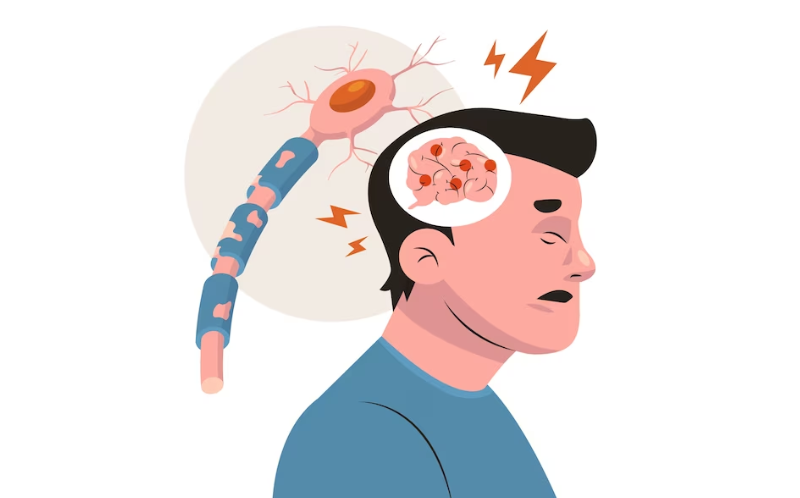
Weed Out Uncertainty: Will Cannabis Help Manage Your Pain?
It’s important to note that while medical marijuana shows promise in managing chronic pain, it may not work for everyone. The effects can depend on the individual, the specific characteristics of the pain being treated, the marijuana strain, and the consumption method. Also, the legal status of marijuana varies by state, so it’s essential for patients to consult with a healthcare provider familiar with medical cannabis to discuss its potential risks and benefits.
Illinois Chronic Pain Guide: Navigating the Medical Marijuana Maze with Your Doctor as Your GPS
If you are suffering from chronic pain, it is important to consult with a medical doctor before you start a new treatment plan. They can help you develop a comprehensive treatment plan that may include a medical card to purchase cannabis medications. Talk with your healthcare provider about the best options for you to follow from these tips, and you may find some of them help improve your quality of life.
Research Reality Check: Unmasking the Truth About Medical Marijuana for Chronic Pain (Spoiler: It's Complex)
The Power of Your Mind: Unlocking the Placebo Effect for Pain
In one study, lead author Karin Jensen, an associate professor and research group leader in the pain neuroimaging lab at the Karolinska Institutet in the Stockholm area, stated that the placebo response constituted 67% of the pain relief attributed to authentic cannabinoids.
Antidepressants: Unveiling the Placebo Paradox (Are You Taking a Sugar Pill?) Mind Over Medicine
The placebo effect contributes to approximately 30-45% of the response observed in individuals taking antidepressants, as indicated by the data. Despite being the third most frequently prescribed medication in the United States, there is still a significant amount that medical experts have yet to comprehend about their mechanisms of action and the factors influencing their efficacy in different individuals.

Its extremely important that medical providers set expectations properly because research isn’t conclusive. Although there have been some good results achieved in various studies, there is also contradictory research that has to be considered. Continued research is required to fully determine the efficacy of cannabis to treat pain.
Additional Resources:
Legal & Medical Disclaimer
The information provided on this blog is for general informational and educational purposes only and is not intended as, nor should it be considered a substitute for, professional medical advice, diagnosis, or treatment. Always seek the advice of your physician or other qualified health provider with any questions you may have regarding a medical condition or treatment and before undertaking a new health care regimen. Never disregard professional medical advice or delay in seeking it because of something you have read on this website.
The content on this blog is provided “as is” and no representations are made that the content is error-free. The website takes no responsibility for errors or omissions in the content of this blog or other websites or resources that may be referenced or linked to herein. The website’s content is not intended to recommend or endorse any specific tests, physicians, procedures, opinions, or other information that may be mentioned on the site.
By using this blog, you agree to the foregoing terms and conditions, which may from time to time be changed or supplemented by this website. If you do not agree to the foregoing terms and conditions, you should not use this blog.
The information provided on this blog is for general informational and educational purposes only and is not intended as, nor should it be considered a substitute for, professional medical advice, diagnosis, or treatment. Always seek the advice of your physician or other qualified health provider with any questions you may have regarding a medical condition or treatment and before undertaking a new health care regimen. Never disregard professional medical advice or delay in seeking it because of something you have read on this website.
The content on this blog is provided “as is” and no representations are made that the content is error-free. The website takes no responsibility for errors or omissions in the content of this blog or other websites or resources that may be referenced or linked to herein. The website’s content is not intended to recommend or endorse any specific tests, physicians, procedures, opinions, or other information that may be mentioned on the site.
By using this blog, you agree to the foregoing terms and conditions, which may from time to time be changed or supplemented by this website. If you do not agree to the foregoing terms and conditions, you should not use this blog.


